7上unit-6知识点复习的讲解
人教版英语七年级上册Unit6知识点总结
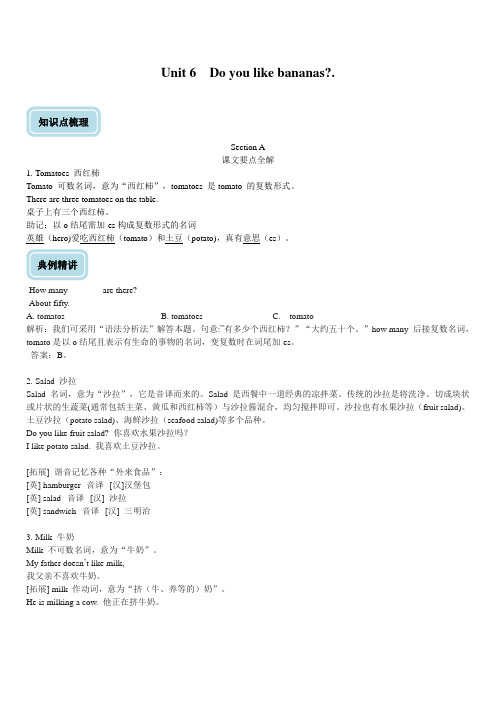
Unit 6 Do you like bananas?.知识点梳理Section A课文要点全解1.Tomatoes 西红柿Tomato 可数名词,意为“西红柿”,tomatoes 是tomato 的复数形式。
There are three tomatoes on the table.桌子上有三个西红柿。
助记:以o结尾需加-es构成复数形式的名词英雄(hero)爱吃西红柿(tomato)和土豆(potato),真有意思(es)。
典例精讲-How many________are there?-About fifty.A.tomatosB. tomatoesC. tomato解析:我们可采用“语法分析法”解答本题。
句意:”有多少个西红柿?”“大约五十个。
”how many 后接复数名词,tomato是以o结尾且表示有生命的事物的名词,变复数时在词尾加-es。
答案:B。
2.Salad 沙拉Salad 名词,意为“沙拉”,它是音译而来的。
Salad 是西餐中一道经典的凉拌菜。
传统的沙拉是将洗净、切成块状或片状的生蔬菜(通常包括主菜、黄瓜和西红柿等)与沙拉酱混合,均匀搅拌即可。
沙拉也有水果沙拉(fruit salad)、土豆沙拉(potato salad)、海鲜沙拉(seafood salad)等多个品种。
Do you like fruit salad? 你喜欢水果沙拉吗?I like potato salad. 我喜欢土豆沙拉。
[拓展] 谐音记忆各种“外来食品”:[英] hamburger--音译--[汉]汉堡包[英] salad--音译--[汉] 沙拉[英] sandwich--音译--[汉] 三明治k 牛奶Milk 不可数名词,意为“牛奶”。
My father doesn’t like milk,我父亲不喜欢牛奶。
[拓展] milk 作动词,意为“挤(牛、养等的)奶”。
He is milking a cow. 他正在挤牛奶。
冀教版英语七年级上册Unit 6 Let's Go!知识点详解 (含答案)

Unit 6 Let’s go!词汇精讲1.ride v.骑;乘坐【用法详解】ride在此处作动词,常见用法如下:ride a/the/one's bike(to...)骑自行车(去……)ride horses/a horse 骑马ride to+地点名词骑车去某地Mary rides her bike to school every day.玛丽每天骑自行车去上学。
My father likes riding horses.我爸爸喜欢骑马。
We can ride to the park.It's near here.我们可以骑车去公园。
它离这儿不远。
【拓展延伸】ride还可作名词,意为”(乘车或骑车的)短途旅程;供乘骑的游乐设施”。
Steve gave me a ride on his motorbike.史蒂夫用摩托车捎了我一程。
The rides are free.免费乘坐。
2.take a/the bus 乘坐公共汽车【用法详解】take a/the bus意为"乘坐公共汽车"。
take作动词,在此处意为"乘坐(某种交通工具)",其后接车、船或飞机等交通工具,即:take a/the bus/train/taxi/plane 等。
You can take a bus to the zoo.你可以坐公共汽车去动物园。
Shall we take a taxi to the hospital? 我们坐出租车去医院,好吗?【拓展延伸】take作动词的其他用法:(1)意为”拿;取”。
Take the books to the classroom,please.请把这些书拿到教室里。
(2)意为"选中;买下”。
I like the T-shirt.I'll take it.我喜欢这件T恤衫。
我要把它买了。
3.get off 下车;从……下来She gets off the bus and turns left. 她下了公共汽车,然后往左拐了。
七年级上册Unit 6 人教版英语中考一轮复习(词汇+语法讲解)

一轮复习:七上U6 词汇+语法讲解【单词默写】【单词变性】healthy形容词变名词______________ really副词变形容词______________ well副词变形容词______________ week名词变形容词______________1. well ______________ _____________________ ___________________ ________________Well, let’s talk about it next time.Mary does well in English.I don't feel very well today.You can get water in the well.2. right ______________ _____________________ ___________________ ________________ ______________ Everyone has his own rights in the society.Yes, that’s right.All right, let’s go to the cinema.I’m sorry. That’s all right.I sit on the right of Mary while Mary sits on the left of me.3. then __________ ___________Till then, everything is too late.First, you put the meat into the pot. Then, mix it with water.4. question ________________ ________________I have many questions to ask my teacher.I was questioned by a policeman about the murder last night.5. want ________________ ________________I want to stay at home because of the rain.You are wanted to be a volunteer.The thief was wanted on the web.Do you want something to drink?【词汇用法】1. sure: adv./adj./be sure to do sth./be sure that…/make sure that…/make sure to do sth.2. so: adv./conj./so adj./adv. that/so that/so as to/not as adj./adv. so/I think so/I hope so.相关词辨析: because vs. sobecause: conj./因为/不与so连用so: conj./所以/不与because 连用3. habit: n./develop a habit of/break a habit of/good habits/bad habits近义词辨析: habit vs. custom vs. culturehabit: n./习惯custom: n./习俗culture: n./文化4. be: v./be+Adj./be+done/be+n./be+to do/be +doing/be +PP(prep. Phrase)5. eat: vt./eat sth./eat up近义词辨析: have vs. eathave: vt./have lunch(享用一餐)eat: vt./eat rice(享用具体的东西)【攻占语法】动词(二) 实义动词一、动词的分类: ____________ _____________ _____________ ______________二、动词的位置: 在句中充当_____________, 放在___________ 的前面或_____________的后面三、动词的用法:2. 实义动词1) 感官动词look/sound/taste/smell/feel +adj.2) 感观动词watch/see/hear/observe sb. do/doing sth.3) 使役动词make/let/have sb. do sth.get sb. to do sth.make sb./sth. donehave sth. donehave sth. doingget sb./sth. done4) 及物动词动词+名词5) 不及物动词动词单独使用动词+介词+名词请在及物动词的框内打”√”,不及物动词的框内打”×”□ask□buy □call□come □eat□excuse □find □finish □get□go□have□know□let□like□look□lose□meet□need□play□say□see□sell□sound□spell□take□thank□think□want□watch□help□love6) 双宾语动词动词+间接宾语+直接宾语动词+直接宾语+to/for +间接宾语请在是双宾语动词的框内打”√”□teach □learn □buy□sell□order □lend □borrow □dress□bring□take□send□give□tell□pay□hand□show□offer□read□pass□help□want【词汇练习】1.Amy usually eats an a ________ after lunch because it's her favorite fruit.2.Let’s think about some food for Henry’s b ________ party.3.For b ________ I have a glass of milk and some bread. They are healthy.4.Potatoes, c ________, and cabbages are vegetables my son likes best.5.We always have rice, chicken and salad for d________.6.I want to know something about David, the volleyball star's e________ habit.7.I have e________ for breakfast every day.8.Judy likes eating sweet food and doesn’t like doing sports. As a result, she becomes f ________ and unhealthier.9.Eggs, milk and strawberries are all healthy f________.10.I eat f ________ and vegetables every day, which are good for my health.11. A good study h ________ will help you learn English well.12.Tom ate a big breakfast. He had a h ________, an egg and milk.13.Do you want to be h _______? Then you need to eat well and do sports every day.14.All the students have l________ at school from Monday to Friday.15.I can’t answer this q ________. It’s too difficult.16.I like English very much. It's r________ easy.17.I need some vegetables, fruits and yogurt to make fruit s ________.18.He doesn’t want to be late for school again, s ________ he eats quickly and runs to school.19.For fruit, Jack likes apples and s________.20.—Can you come to my party?—That’s for s _______.21.I want a bowl of t ________ noodles, because I like vegetables very much.22.Eat more v ________ and less meat, then you will be healthier.23.We have five English classes a w________.24.It is w________ known that Hangzhou is a perfect city for sightseeing.25.Please come to our club, you are w ________ to join us!【参考答案】healthy形容词变名词health really副词变形容词real well副词变形容词good week名词变形容词weekly1. well 好吧擅长感觉舒服井Well, let’s talk about it next time.Mary does well in English.I don't feel very well today.You can get water in the well.2. right 权力对的好吧没关系右边Everyone has his own rights in the society.Yes, that’s right.All right, let’s go to the cinema.I’m sorry. That’s all right.I sit on the right of Mary while Mary sits on the left of me.3. then 那时然后Till then, everything is too late.First, you put the meat into the pot. Then, mix it with water.4. question 问题询问I have many questions to ask my teacher.I was questioned by a policeman about the murder last night.5. want 想应聘通缉想要I want to stay at home because of the rain.You are wanted to be a volunteer.The thief was wanted on the web.Do you want something to drink?一、动词的分类: be 动词情态动词助动词实义动词二、动词的位置: 在句中充当谓语,放在主语的前面或宾语的后面三、动词的用法:请在及物动词的框内打”√”,不及物动词的框内打”×”√ask√buy √call×come √eat√excuse √find √finish √get×go√have√know√let√like×look√lose√meet√need√play√say√see√sell×sound√spell√take√thank×think√want√watch√help√love6) 双宾语动词动词+间接宾语+直接宾语动词+直接宾语+to/for +间接宾语请在是双宾语动词的框内打”√”√teach □learn √buy √sell √order √lend□borrow□dress√bring□take√send√give√tell√pay√hand√show √offer √read√pass□help□want【词汇练习】apple birthday breakfast carrots dinner eating eggs fatter food fruits habit hamburger healthy lessons question really salad so strawberries sure tomato vegetables week well。
人教版七年级上册英语知识点全第六单元unit6知识点
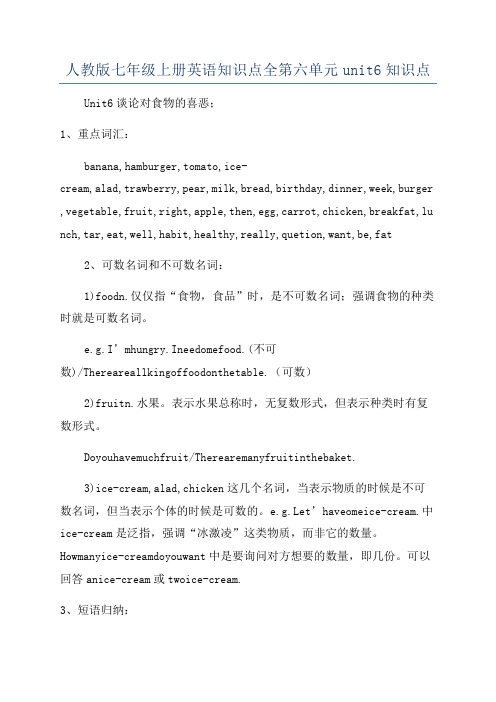
人教版七年级上册英语知识点全第六单元unit6知识点Unit6谈论对食物的喜恶;1、重点词汇:banana,hamburger,tomato,ice-cream,alad,trawberry,pear,milk,bread,birthday,dinner,week,burger ,vegetable,fruit,right,apple,then,egg,carrot,chicken,breakfat,lu nch,tar,eat,well,habit,healthy,really,quetion,want,be,fat2、可数名词和不可数名词:1)foodn.仅仅指“食物,食品”时,是不可数名词;强调食物的种类时就是可数名词。
e.g.I’mhungry.Ineedomefood.(不可数)/Thereareallkingoffoodonthetable.(可数)2)fruitn.水果。
表示水果总称时,无复数形式,但表示种类时有复数形式。
Doyouhavemuchfruit/Therearemanyfruitinthebaket.3)ice-cream,alad,chicken这几个名词,当表示物质的时候是不可数名词,但当表示个体的时候是可数的。
e.g.Let’haveomeice-cream.中ice-cream是泛指,强调“冰激凌”这类物质,而非它的数量。
Howmanyice-creamdoyouwant中是要询问对方想要的数量,即几份。
可以回答anice-cream或twoice-cream.3、短语归纳:John’birthdaydinner约翰的生日晚餐ne某tweek下周thinkabout思考,考虑howabout怎么样omefruit一些水果hibirthday他的生日porttar体育明星eatinghabit饮食习惯forbreakfat作为早餐fordinner作为晚餐onelatquetion最后一个问题healthyfood健康的食品3、tomato可数n.“西红柿”复数形式:tomatoe人教版七上2022知识点总结全类似的以o结尾的名词,需加–e构成复数形式的单词还有potato,hero但photo等词而是以加—构成复数形式的。
七年级上英语unit6知识点

七年级上英语unit6知识点七年级上英语Unit 6知识点Unit 6是七年级上英语的一个重要单元,主要讲述了与天气有关的词汇、句型和表达方式。
下面将为您介绍Unit 6的主要知识点。
一、天气词汇1. sunny:晴朗的2. cloudy:多云的3. rainy:多雨的4. snowy:多雪的5. windy:有风的6. foggy:有雾的7. hot:炎热的8. warm:温暖的9. cool:凉爽的10. cold:寒冷的11. temperature:温度12. degree:度数二、询问天气1. What’s the weather like? 天气怎么样?2. What’s the temperature today? 今天的气温如何?3. Is it raining/snowing outside? 外面下雨/下雪了吗?4. How’s the weather in Beijing? 北京的天气怎么样?5. Do you like the weather here? 你喜欢这里的天气吗?三、描述天气1. It’s sunny/cloudy/rainy/snowy/windy/foggy. 天气晴朗/多云/多雨/多雪/有风/有雾。
2. The temperature is 20 degrees. 气温是20度。
3. It’s a hot/warm/cool/cold day. 今天很热/温暖/凉爽/寒冷。
4. It’s raining/snowing outside. 外面在下雨/下雪。
5. The weather in Beijing is windy. 北京的天气很有风。
四、谈论活动1. What are you going to do on a sunny day? 晴朗的天气你要做什么?2. Let’s go swimming on a hot day. 炎热的天气我们去游泳吧。
七年级上册义务教育版英语书unit6知识点
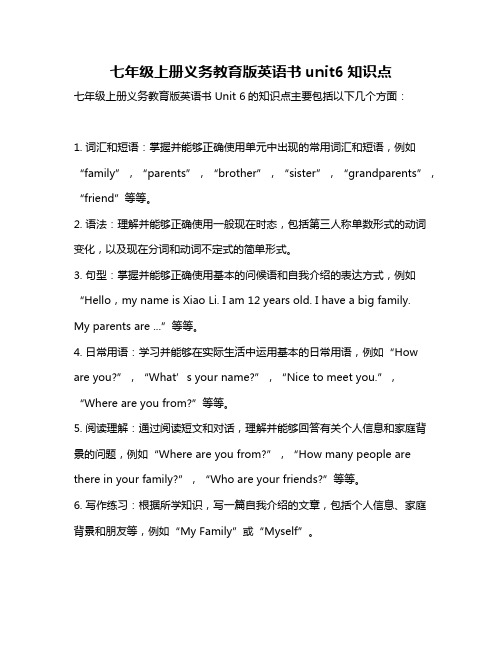
七年级上册义务教育版英语书unit6知识点
七年级上册义务教育版英语书Unit 6的知识点主要包括以下几个方面:
1. 词汇和短语:掌握并能够正确使用单元中出现的常用词汇和短语,例如“family”,“parents”,“brother”,“sister”,“grandparents”,“friend”等等。
2. 语法:理解并能够正确使用一般现在时态,包括第三人称单数形式的动词变化,以及现在分词和动词不定式的简单形式。
3. 句型:掌握并能够正确使用基本的问候语和自我介绍的表达方式,例如“Hello,my name is Xiao Li. I am 12 years old. I have a big family.
My parents are ...”等等。
4. 日常用语:学习并能够在实际生活中运用基本的日常用语,例如“How are you?”,“What’s your name?”,“Nice to meet you.”,“Where are you from?”等等。
5. 阅读理解:通过阅读短文和对话,理解并能够回答有关个人信息和家庭背景的问题,例如“Where are you from?”,“How many people are there in your family?”,“Who are your friends?”等等。
6. 写作练习:根据所学知识,写一篇自我介绍的文章,包括个人信息、家庭背景和朋友等,例如“My Family”或“Myself”。
以上是Unit 6的主要知识点,要掌握这些知识点需要大量的练习和反复的实践。
同时,要注重英语口语和听力的训练,以便在实际生活中更好地运用英语进行交流。
Unit6讲义人教版英语七年级上册
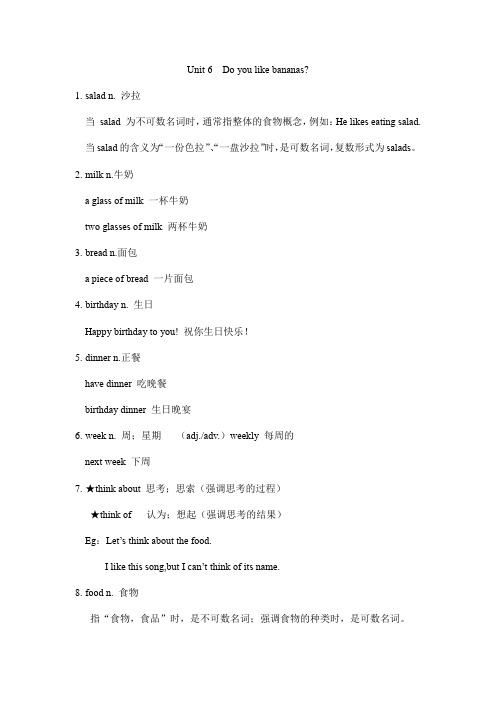
Unit 6 Do you like bananas?1.salad n. 沙拉当salad 为不可数名词时,通常指整体的食物概念,例如:He likes eating salad.“一盘沙拉”时,是可数名词,复数形式为salads。
当salad的含义为“一份色拉”、k n.牛奶a glass of milk 一杯牛奶two glasses of milk 两杯牛奶3.bread n.面包a piece of bread 一片面包4.birthday n. 生日Happy birthday to you! 祝你生日快乐!5.dinner n.正餐have dinner 吃晚餐birthday dinner 生日晚宴6.week n. 周;星期(adj./adv.)weekly 每周的next week 下周7.★think about 思考;思索(强调思考的过程)★think of 认为;想起(强调思考的结果)Eg:Let’s think about the food.I like this song,but I can’t think of its name.8.food n. 食物指“食物,食品”时,是不可数名词;强调食物的种类时,是可数名词。
9.right adj. 正确的;—(反义词)wrong 错误的adj. 右边的;—(反义词)left 左边的★All right!用作对方建议或劝告的应答语。
Eg:—Let’s go and ask him.让我们去问他。
—All right. 好的。
10.star n. 星星;明星a volleyball star 一个排球明星11.eat v. 吃★eating habits 饮食习惯12.well adv. 好;令人满意地(adj.)good 好的Eg:Sports Star Eats Well.I have good eating habits.13.question n. 问题one last qusetion 最后一个问题14.healthy adj. 健康的(n.)health 健康★keep healthy 保持健康15.want v. 想要want sth. 想要某物want to do sth. 想要做某事want sb. to do sth. 想要某人做某事Eg:I don’t want to be fat.16.—What do you like for breakfast?—I like ........【语法】名词的单复数有些名词既可作可数名词又可作不可数名词,但意义不同,要注意区分.①glass cn.杯子un.玻璃orange cn橘子un.橘汁①还有表示动物类的名词,表示动物时是可数名词,表示为菜肴时是不可数名词. chicken cn.小鸡un.鸡肉fish cn鱼un鱼肉①salad, icecream, food, fruit 作总称讲是不可数名词,作种类讲是可数名词【即学即练】一、请写出下列词的复数形式city _____ _zoo ______country _____ tooth ____mouse _________ boy____________ broom ___________car ____tree ______horse ______ bus______________ fox _____branch ____ baby _____ family _____ dish _____radio _____ photo _____ piano _____ knife _____leaf _____ life _____ thief _____ _man _____woman _____ child ___ foot______this _____________ watch___________ diary____________ day____________ book____________dress____________ sheep___________ tea_____________ box___________ strawberry_________ peach__________ sandwich__________ paper_________ juice__________ water____________ milk___________ rice__________people ______CD________ ox___________deer____________ fish___________二、选择填空.( )1. They e from different ______A. countryB. countriesC. a countryD. countrys( )2. How many ______ do you see in the picture?A. tomatosB. tomatoesC. tomatoD. the tomato( )3. They are______.A . woman teachers B. women teachersC. women teacherD. woman teacher( )4. Would you like _______ ,please?A. two glass of waterB. two glasses of waterC. two glass of watersD. two glasses of waters( )5. Most of ______ live in _______.A. Germans, GermanB. German, GermenC. Germen, GermanyD. Germans, Germany( )6. There are some ______ in these _______.A. knifes pencilboxesB. knives pencilsboxC. knives pencilboxD. knives pencilsboxes( )7. ______ like ______ by air.A. Greens, travellingB. The Green, travelingC. The Greens, travelD. The Greens, traveling( )8. I wonder why ______ are interested in action films(武打片).A. the peopleB. peopleC. peoplesD. the peoples( )9. There is no ______ in the plate.A. applesB. orangesC. riceD. eggs( )10.My uncle has three _______.A.childB.childsC.childrenD.childrens四.填入所给名词的正确形式。
七年级上册英语六单元知识点归纳
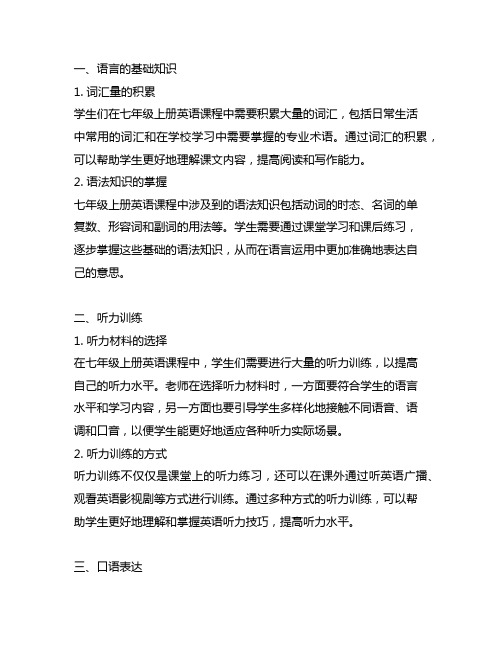
一、语言的基础知识1. 词汇量的积累学生们在七年级上册英语课程中需要积累大量的词汇,包括日常生活中常用的词汇和在学校学习中需要掌握的专业术语。
通过词汇的积累,可以帮助学生更好地理解课文内容,提高阅读和写作能力。
2. 语法知识的掌握七年级上册英语课程中涉及到的语法知识包括动词的时态、名词的单复数、形容词和副词的用法等。
学生需要通过课堂学习和课后练习,逐步掌握这些基础的语法知识,从而在语言运用中更加准确地表达自己的意思。
二、听力训练1. 听力材料的选择在七年级上册英语课程中,学生们需要进行大量的听力训练,以提高自己的听力水平。
老师在选择听力材料时,一方面要符合学生的语言水平和学习内容,另一方面也要引导学生多样化地接触不同语音、语调和口音,以便学生能更好地适应各种听力实际场景。
2. 听力训练的方式听力训练不仅仅是课堂上的听力练习,还可以在课外通过听英语广播、观看英语影视剧等方式进行训练。
通过多种方式的听力训练,可以帮助学生更好地理解和掌握英语听力技巧,提高听力水平。
三、口语表达1. 口语练习的重要性在七年级上册英语课程中,口语练习是非常重要的一环。
通过口语练习,学生不仅可以提高自己的口语表达能力,还可以锻炼自己的语音、语调和语速。
口语练习还可以帮助学生更好地融入英语学习环境,增强自信心。
2. 口语练习的方式老师可以通过角色扮演、小组讨论、情景对话等方式,引导学生进行口语练习。
学生也可以在课外积极参与英语角、英语演讲比赛等活动,提高自己的口语表达能力。
四、阅读训练1. 阅读材料的选择在七年级上册英语课程中,阅读训练是非常重要的一环。
老师在选择阅读材料时,要根据学生的兴趣爱好和实际水平,选择符合学生认知特点和学习目标的阅读材料。
要注重开展多样化的阅读活动,丰富学生的阅读内容,激发学生的阅读兴趣。
2. 阅读技巧的培养老师在进行阅读训练时,要引导学生培养良好的阅读习惯,包括预习、精读、泛读等阅读技巧。
要注重培养学生的阅读理解能力和阅读表达能力,使学生能够更好地理解课文内容,提高阅读水平。
七年级上册u6的知识点

七年级上册u6的知识点七年级上册Unit 6的知识点Unit 6是七年级上册英语教材中的一单元,主要涉及到一些日常生活中的用语和对话。
本文将为大家详细介绍Unit 6的知识点。
1. 介绍自己当我们第一次见到新的朋友或者老师时,通常需要介绍自己。
下面是一个简单的自我介绍的范例:Hello! My name is Tom. I'm 13 years old. I'm from China. I like playing basketball and reading books. Nice to meet you!这里需要注意的是,我们在介绍自己的时候要注意用到一些基本的动词时态,比如现在时和一般过去时。
同时,我们需要注意一些基本的单词和短语,比如名字、年龄、出生地和爱好等。
2. 问候与回应在日常生活中,我们经常需要用到一些问候和回应的用语。
下面是一些常见的问候和回应:- Good morning! 早上好!- Good afternoon! 下午好!- Good evening! 晚上好!- How are you? 你好吗?- I'm fine, thank you. 我很好,谢谢。
- Nice to meet you! 很高兴见到你!总的来说,在问候和回应时我们需要注意礼貌和尊重对方的感受。
3. 请求和回答在日常生活中,我们也经常需要请求和回答一些问题。
下面是一些常见的请求和回答:- Can you help me? 你能帮我吗?- Sure. 当然。
- Could you pass me the book, please? 你能把书递给我吗?- Here you are. 给你。
- May I borrow your pen? 我可以借下你的笔吗?- Sorry, I don't have a pen. 很抱歉,我没有笔。
在请求和回答的过程中,我们需要注意礼貌和尊重对方的意愿。
七上英语第六单元知识点归纳
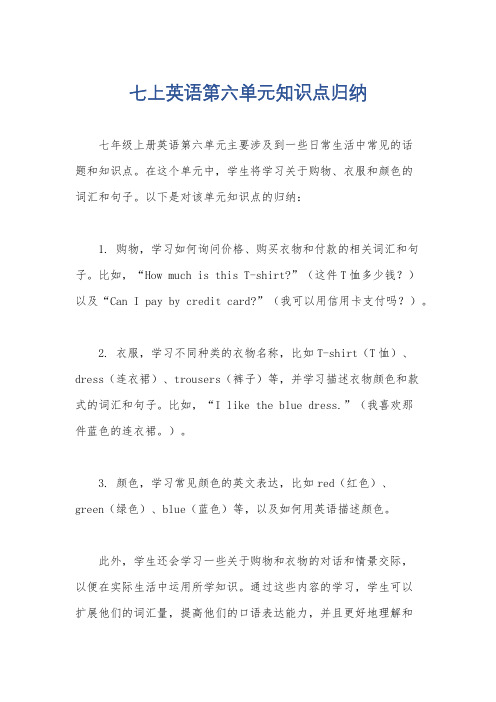
七上英语第六单元知识点归纳
七年级上册英语第六单元主要涉及到一些日常生活中常见的话
题和知识点。
在这个单元中,学生将学习关于购物、衣服和颜色的
词汇和句子。
以下是对该单元知识点的归纳:
1. 购物,学习如何询问价格、购买衣物和付款的相关词汇和句子。
比如,“How much is this T-shirt?”(这件T恤多少钱?)
以及“Can I pay by credit card?”(我可以用信用卡支付吗?)。
2. 衣服,学习不同种类的衣物名称,比如T-shirt(T恤)、dress(连衣裙)、trousers(裤子)等,并学习描述衣物颜色和款
式的词汇和句子。
比如,“I like the blue dress.”(我喜欢那
件蓝色的连衣裙。
)。
3. 颜色,学习常见颜色的英文表达,比如red(红色)、
green(绿色)、blue(蓝色)等,以及如何用英语描述颜色。
此外,学生还会学习一些关于购物和衣物的对话和情景交际,
以便在实际生活中运用所学知识。
通过这些内容的学习,学生可以
扩展他们的词汇量,提高他们的口语表达能力,并且更好地理解和
运用日常生活中的英语知识。
总的来说,第六单元的重点是围绕购物、衣服和颜色展开,通过学习相关词汇和句子,帮助学生在日常生活中更加流利地运用英语进行交流和表达。
七年级上学期-Unit6语法讲解

7A6 条件状语从句1.状语从句概念:指表示条件,时间,地点,原因,方式,目的,结果等状态的句子。
引导词引导的句子称为从句,另一部分的句子就是主句。
Eg.If I stay alone(从句), I will feel lonely(主句).2.条件状语从句常用的引导词:if,unless(=if not)3.用法:①if 在条件状语从句中表示“如果”,一般遵循“主将从现”的原则(主句用一般将来时,if引导的从句用一般现在时).eg.If you work out this problem, I will give you a surprise.②unless,表示“除非”,相当于“if…not”,eg. We won't go home unless we finish our work.=We won't go home if we don't finish our work.4.注意事项:if在三种情况下不需要遵循“主将从现”:①主句中出现情态动词.e.g. You can arrive here earlier if you leave there earlier.②祈使句.e.g. Please remember me to her if you see her.③客观真理.e.g.If you boil water, it bees steam.附加:祈使句,and ….如:Listen carefully, and you will get a card.= If you listen carefully, you will get a card.Stop talking, and I will tell you a story.= If you stop talking, I will tell you a story. 祈使句,or...如:Get up, or you will miss the bus.=If you don’t get up, you will miss the bus.=Unless you get up, you will miss the bus.。
七年级上册unit6 知识点总结
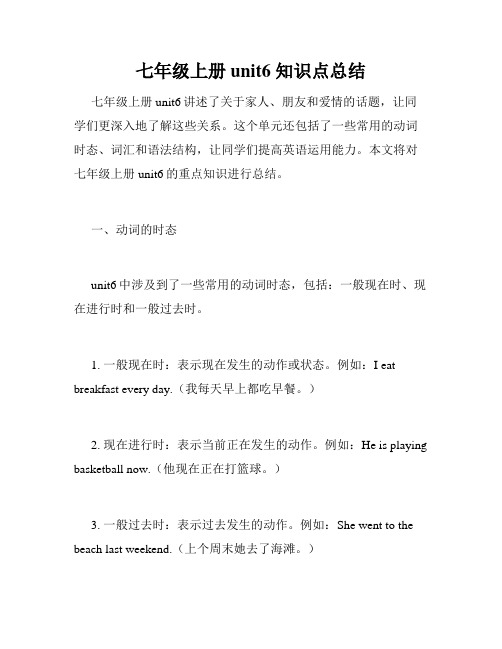
七年级上册unit6 知识点总结七年级上册unit6讲述了关于家人、朋友和爱情的话题,让同学们更深入地了解这些关系。
这个单元还包括了一些常用的动词时态、词汇和语法结构,让同学们提高英语运用能力。
本文将对七年级上册unit6的重点知识进行总结。
一、动词的时态unit6中涉及到了一些常用的动词时态,包括:一般现在时、现在进行时和一般过去时。
1. 一般现在时:表示现在发生的动作或状态。
例如:I eat breakfast every day.(我每天早上都吃早餐。
)2. 现在进行时:表示当前正在发生的动作。
例如:He is playing basketball now.(他现在正在打篮球。
)3. 一般过去时:表示过去发生的动作。
例如:She went to the beach last weekend.(上个周末她去了海滩。
)二、常用词汇和短语1. family(家庭):指父母和孩子、兄弟姐妹等亲属关系。
2. friend(朋友):指彼此之间有交情或感情的人。
3. love(爱情):指深厚的感情关系,可以是亲情、友情和爱情等。
4. have fun(玩得开心):用于描述某人正在享受某种乐趣或玩得很高兴。
5. get together(聚会):用于描述好友、家人等在一起做某种活动。
三、重要语法结构1. 代词:用于代替名词,以使句子更加简洁。
例如:My mother is a teacher. She loves her job.(我妈妈是一名教师。
她热爱她的工作。
)2. 比较级和最高级形式:用于比较两个或多个事物的大小、重要性等。
例如:My cat is bigger than hers.(我的猫比她的大。
)3. 非谓语动词:包括动词不定式、动词-ing形式和动词分词等。
非谓语动词可以作为主语、宾语等。
例如:Swimming is good for health.(游泳有益于健康。
)以上就是七年级上册unit6的重点知识总结,包括常用的动词时态、词汇和语法结构。
人教版七年级英语上Unit6单词,知识梳理,词汇句式精讲(全)
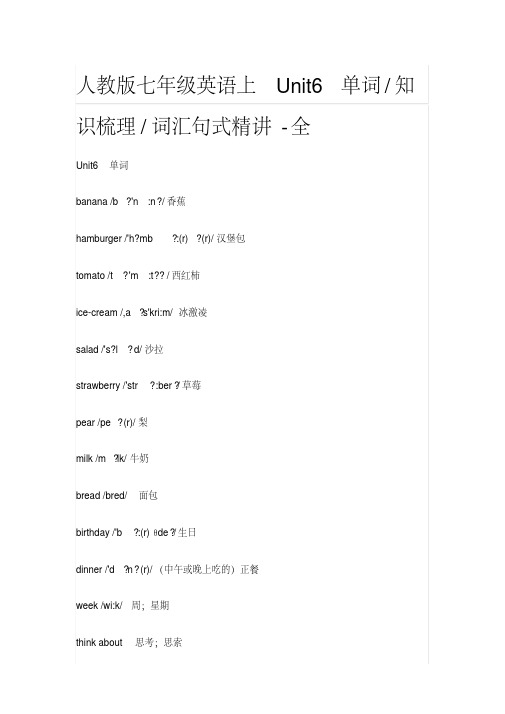
人教版七年级英语上Unit6单词/知识梳理/词汇句式精讲-全Unit6 单词banana /b?'nɑ:n?/香蕉hamburger /'h?mb?:(r)ɡ?(r)/汉堡包tomato /t?'mɑ:t??/西红柿ice-cream /,a?s'kri:m/冰激凌salad /'s?l?d/沙拉strawberry /'str?:ber?/草莓pear /pe?(r)/梨milk /m?lk/牛奶bread /bred/面包birthday /'b?:(r)θde?/生日dinner /'d?n?(r)/(中午或晚上吃的)正餐week /wi:k/周;星期think about思考;思索food /fu:d/食物sure /???(r)/当然;肯定;一定How about...?(提出建议)...怎么样?burger /'b?:(r)ɡ?(r)/汉堡包= hamburger vegetable /'ve?t?b?l/蔬菜fruit /fru:t/水果right /ra?t/正确的;适当的apple /'?pl/苹果then /een/那么egg /eɡ/蛋;鸡蛋carrot /'k?r?t/胡萝卜rice /ra?s/大米;米饭chicken /'??k?n/肌肉so /s??/ (引出评论或问题)那么breakfast /'brekf?st/早餐;早饭lunch /l?n?/午餐star /stɑ:(r)/明星;星星eat /i:t/吃well /wel/好;令人满意的habit /'h?b?t/习惯healthy /'helθi/健康的really /'ri:?li/真正地question /'kwes??n/问题want /w?nt/需要;想要be /bi:/变成fat /f?t/肥的;肥胖的2Unit6 知识梳理【重点短语】1. John ’s birthday dinner 约翰的生日宴会2. vegetable salad 蔬菜沙拉3. two tomatoes 两个西红柿4. eat well 吃得营养5. think about 考虑6. eat/have breakfast/lunch/dinner 吃早/午/晚饭7. sports stars 体育明星8. the volleyball star 排球明星9. ask sb. about sth. 问某人某事10. like hamburgers/ice-cream 喜欢汉堡包/冰淇淋11. like eating eggs 喜欢吃鸡蛋12. her eating habits 她的饮食习惯13. be (not) healthy (不)健康14. one last question 最后一个问题15. healthy food 健康食物16. after breakfast/lunch/dinner 早/午/晚饭后【重点句型】1.—Do you like salad? 你喜欢沙拉吗?一Yes,I do. /No, I don’t. 是的,我喜欢。
七年级英语上unit6知识点

七年级英语上unit6知识点Unit 6: Talking about Future PlansAs a seventh-grade English learner, you've probably talked about what you and others are doing now and what you did yesterday. This unit focuses on talking about future plans. In this article, we'll explore the key grammar structures, essential vocabulary, and useful expressions to talk about your plans and dreams for the future.Verb Tenses for Future PlansTo talk about future plans, we need to use the future tense. There are several ways to form the future tense in English:1. "Will" + Verb: We use "will" to make predictions or talk about future events that we decide to do spontaneously.Example: I will travel to Paris next summer.2. "Going to" + Verb: We use "going to" to talk about future plans that we have already decided or arranged.Example: I am going to visit my grandparents next weekend.3. Present Continuous Tense: We use the present continuous tense to talk about future arrangements or plans that we have already made.Example: She is taking a flight on Friday to visit her friends in London.Vocabulary and Expressions for Future Plans1. Career: Some of the most common future plans revolve around career goals, such as getting a promotion, starting a business, or pursuing higher education. Here are some essential vocabulary words and expressions related to career goals:- I want to become a doctor/lawyer/engineer/teacher/artist.- I plan to go to college/university.- I hope to get a scholarship for my studies.- I'm thinking of starting my own business someday.- My dream is to work for a big company.2. Travel: Another popular topic for talking about future plans is travel. Here are some vocabulary words and expressions to describe your upcoming travels:- I'm planning to travel to Japan/France/Canada/Spain.- I'm going on a trip to Hawaii/Thailand/Italy next year.- My family and I are planning a road trip across the United States.- I've always wanted to go on a safari in Africa.- I'm hoping to backpack through Europe after I graduate from high school.3. Hobbies: You might also have future plans related to your hobbies or interests. Here are some words and expressions to describe your future plans in this area:- I'm going to take guitar/piano/dance lessons.- I'm thinking of joining a book club/a sports team.- My goal is to learn a new language.- I want to run a marathon someday.- I'm planning to start my own blog/vlog/Youtube channel.ConclusionTalking about future plans is an essential skill in English. It allows us to communicate our dreams and aspirations and share our goals with others. By learning the grammar structures, useful expressions, and essential vocabulary related to future plans, you'll be better equipped to speak confidently and fluently about your future plans in English.。
七年级英语上册第六单元知识点总结ppt
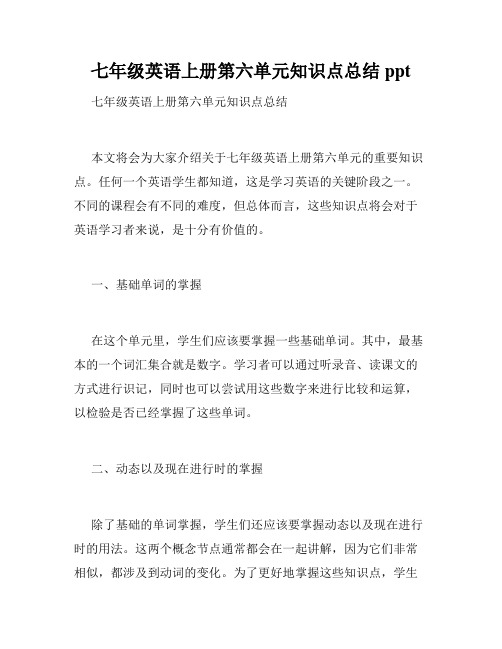
七年级英语上册第六单元知识点总结ppt 七年级英语上册第六单元知识点总结
本文将会为大家介绍关于七年级英语上册第六单元的重要知识点。
任何一个英语学生都知道,这是学习英语的关键阶段之一。
不同的课程会有不同的难度,但总体而言,这些知识点将会对于英语学习者来说,是十分有价值的。
一、基础单词的掌握
在这个单元里,学生们应该要掌握一些基础单词。
其中,最基本的一个词汇集合就是数字。
学习者可以通过听录音、读课文的方式进行识记,同时也可以尝试用这些数字来进行比较和运算,以检验是否已经掌握了这些单词。
二、动态以及现在进行时的掌握
除了基础的单词掌握,学生们还应该要掌握动态以及现在进行时的用法。
这两个概念节点通常都会在一起讲解,因为它们非常相似,都涉及到动词的变化。
为了更好地掌握这些知识点,学生
们应该要多进行口头练习,尝试用不同的形式来表达动态以及现在进行时。
三、准确句型的应用
学生们在学习完课本中的知识点之后,还需要实际运用到日常生活中。
这时候,准确的句型应用就尤为重要。
在进行英文口语交流的时候,学生们应该要尝试应用之前所学习的知识点,掌握良好的表达技巧以及流利的口语表达能力。
综上所述,七年级英语上册第六单元的知识点总结重点包括基础单词的掌握、动态以及现在进行时的掌握以及准确句型的应用等几个方面。
学生要掌握这些知识点,需要多进行练习、多进行口语表达等方面的实践练习,这样才能够全面提高英语水平。
新目标英语七年级(上)Unit 6 知识要点归纳初中英语知识点
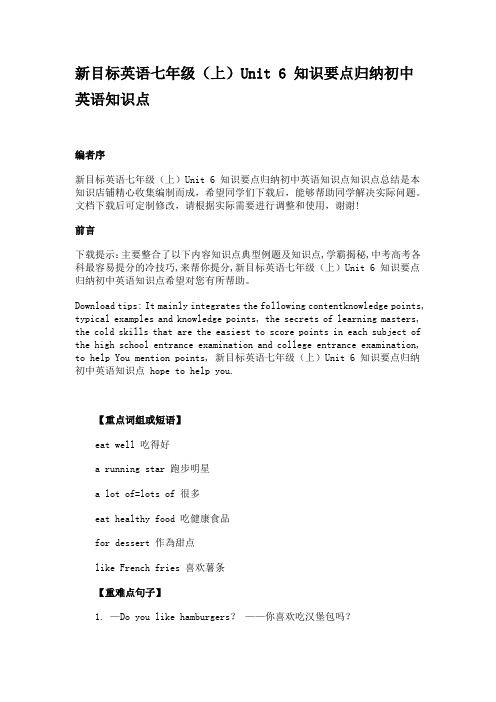
新目标英语七年级(上)Unit 6 知识要点归纳初中英语知识点编者序新目标英语七年级(上)Unit 6 知识要点归纳初中英语知识点知识点总结是本知识店铺精心收集编制而成,希望同学们下载后,能够帮助同学解决实际问题。
文档下载后可定制修改,请根据实际需要进行调整和使用,谢谢!前言下载提示:主要整合了以下内容知识点典型例题及知识点,学霸揭秘,中考高考各科最容易提分的冷技巧,来帮你提分,新目标英语七年级(上)Unit 6 知识要点归纳初中英语知识点希望对您有所帮助。
Download tips: It mainly integrates the following contentknowledge points, typical examples and knowledge points, the secrets of learning masters, the cold skills that are the easiest to score points in each subject of the high school entrance examination and college entrance examination, to help You mention points, 新目标英语七年级(上)Unit 6 知识要点归纳初中英语知识点 hope to help you.【重点词组或短语】eat well 吃得好a running star 跑步明星a lot of=lots of 很多eat healthy food 吃健康食品for dessert 作為甜点like French fries 喜欢薯条【重难点句子】1. —Do you like hamburgers?——你喜欢吃汉堡包吗?—Yes, I do./No,I don’t. ——是的,我喜欢。
/不,我不喜欢。
2. —Do they like French fries?——他们喜欢吃薯条吗?—Yes, they do./No,they don’t. ——是的,他们喜欢。
- 1、下载文档前请自行甄别文档内容的完整性,平台不提供额外的编辑、内容补充、找答案等附加服务。
- 2、"仅部分预览"的文档,不可在线预览部分如存在完整性等问题,可反馈申请退款(可完整预览的文档不适用该条件!)。
- 3、如文档侵犯您的权益,请联系客服反馈,我们会尽快为您处理(人工客服工作时间:9:00-18:30)。
Unit 61.It’s noon. Let’s have a hamburger. 在中午,我们吃中饭。
At noon, we have lunch.下午/在下午afternoon / in the afternoon在十一月二十日的下午on the afternoon of November 24th1 / 35在10:302.half past ten=ten thirty一个半小时one and a half hours二个半小时two and a half hours两年半是相当长的时间。
2 / 35Two and a half years is quite a long time.It takes him two and a half years ___ (finish)____(make) this plane.时间的表达法:2:02 two two ; two past two1:58 one fifty-eight; two to two8:25 eight twenty-five;twenty-five past eight3 / 358:35 eight thirty-fivetwenty-five to nine3. Hamburgers are not good for us.be good for ..对……有好处be bad for 对……有害Morning exercises ____(be) good for our health.Doing morning exercises ____(be) good for4 / 35our health.be good at……擅长于……They are good at ______(tell) funny stories. health 名词身体good healthin good health./in bad healthhealthy 形容词keep healthyIt is good for us to keep healthy.4. 每天一个苹果使医生远离我。
5 / 35An apple a day keeps the doctor away. Keep…away 使……远离使你的长发远离你的火。
Keep your long hair away from the fire.我们应该使孩子远离脏水。
We should keep the children away from the dirty water.1).keep +形容词6 / 35Keep quiet. Keep healthy. Keep fit.2).keep+名词、代词+形容词(现在分词)让我等久了。
Keep me waiting for long让窗户关闭。
Keep the windows closed.3).keep +doing 反复做……他不断地问我相同的问题。
7 / 35He keeps asking me the same question. We should do sports _____(keep) healthy. Do you know how _____(keep) healthy?5.How about +doing sth?做某事怎么样?How about ____(fly) kites?How about_____(watch) TV?How about_____(paint) the wall white?6.vegetables:potatoes tomatoes carrots8 / 35fruits: lemons watermelons meat: chicken beef porkdrink:milk juicesnacks: chocolate sweetsReading :每天我跳舞半个小时。
1.I dance for half an hour every day.1 29 / 351)How long do you dance every day?2)How often do you dance for half an hour?2.健康的食物对我重要。
Healthy food is important for me.=It is important for me to eat healthy food.对我们来说学好英语是重要的。
It is important for us to learn English well.健康的食物为什么对你来说是重要的?10 / 35Why is healthy food so important for you? 因为她需要保持健康。
Because she needs to keep fit.3.I need to keep fit.需要(做)某事need sth/ need to do sth(实义动词需要) 你需要一些牛奶吗?Do you need any milk?11 / 35填空:1)She needs ____ (have) a good rest.2) He needs _____(exercise) more.学生们一个多锻炼来保持健康。
Students should do more exercise to keep fit. 填空:What do you need___(do) after ____(run)?12 / 354. For lunch and dinner, I usually eat fish and vegetables.5. Sometimes I feel hungry between meals. feel 连系动词;感到填空:___ he ____(feel) happy?____he happy?(be)I feel tired. I don’t feel well.13 / 35between meals(两餐之间) (介词)He sits between her and me.6.I seldom eat cakes or sweets.(and x) They have too much sugar and bad for my teeth. too much +sugar(不可数名词)too much beef/ too much juice/too much waterHe does little but talks too much.14 / 35He brushes his ____(tooth) after he gets up. ____(eat) too much sweets ___(be) bad for your ____(tooth).The best time____(brush) your teeth is three minutes after meals.foot---feetPut your ____(foot) under your chair on the bus.15 / 35I think Americans eat too much .much too+形容词You are much too kind to me.It’s much too cold.You are driving too much fast.7. I seldom exercise.exercise =do sports动词锻炼He often ____( exercise) after ___( get) up.16 / 358.Hamburgers and cola ____(be) not ___(health).9.I need to change my lifestyle.I want to change our seats.Can we change our ideas?He doesn’t need to change his lifestyle . change 还可以做名词变化、零钱Changes are around us every day.17 / 35Here’s your change.They have ____(health) ____(lifestyle).10.I plan to eat more fruit and vegetables . plan to do sth 计划做。
The Blacks plan a trip to Beijing.They plan ___(have) a fashion show next week.He plans ___(go) on holiday next month.18 / 35They are ____(plan) ___(visit) my hometown now.Our parents often plan everything carefully for us.What does he plan to eat every day?Let’s make a plan(名词) for our Christmas Day party.I plan to go swimming every week.19 / 35I need to eat some fish.There is a swimming pool near my home. Grammar:1.What interesting _____(story)!2.She has two ____(toy)____(bus).3.I have two ____(wish),one is ____(go) to Beijing for a holiday. The other is ___(e-mail)20 / 35to my parents.They are watching football __(match) on TV.I take many ____(photo) of birds.You need to eat ____(many) ___(potato)and ___(tomato) tha before.She cuts the apple into three___(half).She has saved a lot of people’s ___(life) There are 10 ____(man) ___(doctor) in this21 / 35hospital.We need 15___(woman) teachers. What do its____(foot) look like?Brush your ____(tooth) before meals. June 1st is _____(child) Day.There are lots of little_____(sheep) in it. She has three ___(piece) of ____(bread). These ___(glass) are made of ___(glass).22 / 35There are two____(plate) of ____(chicken). There are four ___(packet) of ____(salt).I want 2___(kilo) of meat.She needs 5____(carton) of milk.3.Do we need ___(buy) carrats?4.They’re ____(parent) favourite.5. We can also buy a few ___(bottle) of juice.a few 修饰可数名词表示有一些23 / 35I have a few friends at school.few 也修饰可数名词表示几乎没有She often stays at home at weekends. She has ____ friends.6. I exercise less than 3 times a week.How often do you exercise?less than 不到少于more than 多于I sleep for less than 8 hours every night.24 / 35She often watches TV for more than one hour.---How often do you take a walk(散步)?--- Never./Seldom./ More than twice a week.I sleep for less than 8hours a day.Our school can hold more than 3,000 people.7.Total number of us.total 形容词总的、全部的25 / 35The total money is one thousand.I have six new books in total.number 名词数、数量the number of …。
